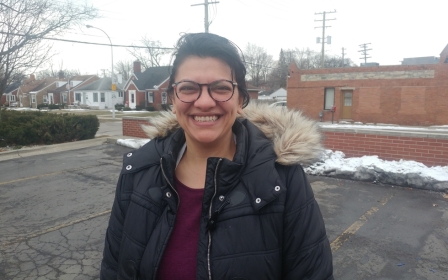US candidates critical of Israel face political attacks

WASHINGTON, DC – As the US mid-term legislative elections approach, several Democratic candidates are facing accusations of anti-Semitism for their critical stance on Israel, highlighting the relevance of the Middle East conflict in US politics.
Still, at least three of those candidates have secured their party's nomination, challenging a prevalent norm in US politics where being perceived as hostile to Israel can be a career-ending taboo.
Candidate Ammar Campa-Najjar, who is running for Congress from San Diego, was chastised by Israeli media for being the grandson of an alleged militant. Campa-Najjar’s grandfather, Muhammad Youssef al-Najjar, was an officer in the Palestine Liberation Organisation (PLO) who was assassinated by the Mossad in 1973 in Lebanon.
In US politics being perceived as hostile to Israel can be a career-ending taboo
Various US and Israeli media outlets, including Haaretz, the San Diego Tribune and the Times of Israel, slammed Campa-Najjar's grandfather, calling him a "terrorist".
Israel had linked the candidate's grandfather to the Munich attack in 1972 when a group of Palestinian gunman seized and killed 11 Israeli athletes at the Olympic games in Germany. While distancing himself from his grandfather, Campa-Najjar still acknowledges his Palestinian identity.
Virginia Democrat Leslie Cockburn took a hit in her campaign when a book she wrote that criticised Israeli-US relations came to light. The GOP even labelled her a "virulent anti-Semite" because of it.
Last month, the Virginia Republican Party called on the Democratic Party to withdraw support for Cockburn, saying that she "has a long history of anti-Semitic rhetoric, which can be documented over at least the past 25 years".
Pennsylvania Democrat Scott Wallace was denounced because his family’s foundation, the Wallace Global Fund, indirectly donated money to groups linked to the Boycott, Divestment, and Sanctions (BDS) movement. The Democratic Jewish Outreach Pennsylvania refused to endorse Wallace accordingly.
In mainstream US politics, denouncing Israel can prove costly. Paul Findley, a former congressman from Illinois, says he was taken down by the Israel lobby for condemning Israel.
He cites pro-Israel groups as one of the main reasons he lost his re-election bid in 1982, after serving 11 consecutive terms in Congress.
'Conventional wisdom'
George Bisharat, a professor at Hastings College of the Law and a commentator on the Palestine-Israel conflict, said Israel's supporters are capable of mobilising opposition against candidates in US elections.
“When the pro-Israel lobby wants to put its resources against the candidate, it can do so, and do so with success,” Bisharat told Middle East Eye.
In 2016, Congressman Keith Ellison was vying for chair of the Democratic National Convention (DNC). He was endorsed by progressive leader Bernie Sanders and had the support of Chuck Schumer, the current Senate minority leader and a strong supporter of Israel.
Late into his campaign, Ellison was denounced for statements he had made against Israel. The Anti-Defamation League (ADL), a pro-Israel advocacy group, said Ellison was unfit to chair the DNC because he had stated that American foreign policy in the Middle East should not be driven by Israel.
Days before the vote, DNC members received an email saying “electing Keith Ellison would send the wrong message. I urge you to consider instead a candidate who will unify the party, bring in Independents, and continue our strong tradition of maintaining a robust US-Israel bond”.
Last year in Illinois, local politician Carlos Ramirez Rosa was initially a running mate for Daniel Biss, who was vying for governorship in 2017. However, after it became known that Ramirez Rosa supported the BDS movement, Biss dropped him from his campaign.
Biss subsequently lost the Democratic primary.
Omar Baddar, deputy director of the Arab American Institute, said condemning Israel is not politically safe in the US.
“It is conventional wisdom that you cannot criticise Israel in American politics,” Baddar told MEE.
'The landscape is changing'
However, there has been a recent shift in the political environment that is allowing room for Israel's opponents, analysts say.
It is partly because of a leftward drift of the Democratic Party, along with the leadership of Senator Bernie Sanders. Reactions to the latest violence against Palestinians in Gaza has created a small crack in the American political environment, said Baddar.
Bisharat echoed Baddar's sentiments.
“The landscape is changing, there is greater distance between the positions taken by congressional leaders on the Democratic side,” said Bisharat. “The cost of criticising Israel may be diminishing.”
On Tuesday, 28-year-old activist Alexandria Ocasio-Cortez from New York, who had called on Democrats to speak out against the "massacre" in Gaza, defeated top Democratic Congressman Joe Crowley in the primaries.
While Keith Ellison did not become the chair of the DNC, he did become deputy chair and his career remains intact, despite the attacks against him.
“I believe that Ellison will survive. And that the battle will solidify the place of Palestinian solidarity inside the Democratic Party,” wrote Phillip Weiss on Mondoweiss, a left-leaning news website reporting on Palestine, Israel, and the US.
The candidates in the mid-term elections have continued to speak out about the Palestine-Israel conflict.
“The final arrangement will be a peace deal neither side wants, but everyone needs. Ultimately, Israel will have to acknowledge its wrongdoings as the sovereign state and accept the Palestinian's rights to self-determination, independence and equality,” Campa-Najjar said in a statement to the San Diego Tribune.
Taking the middle ground
Campa-Najjar, the son of a Mexican-American mother and a Palestinian immigrant father, has taken a middle-ground approach to the Palestine-Israel issue, insisting that he still supports the sovereignty of Israel. The 28-year-old candidate was born and raised in California, but he lived in Gaza for four years as a child before returning to San Diego.
"Ammar’s experience in Gaza, where he witnessed war and poverty, emboldened him to become a strong supporter of peace and economic justice," reads a statement on his campaign website.
Cockburn also remains steadfast in the defence of her views. Her book, Dangerous Liaison, was written during her career as a journalist. She had a long career as a reporter, working for CBS, NBC, and PBS.
“Yes, the US should support Israel, and yes, the US should be supporting, to some degree, the Palestinian Authority,” Cockburn said at a Jewish congregation in Charlottesville. “We have a disaster area in Gaza, and the US should get involved in trying to sort that out.”
In Pennsylvania, the Republican Jewish Coalition has spent more than $500,000 for an advertising campaign against Wallace, highlighting his contributions to BDS-linked groups as well as his support for the Iran nuclear deal.
Wallace responded to these charges by saying in a statement: “I am committed to working to preserve our nation’s commitment to Israel, to a nuclear-free Iran, and to a peaceful two-state solution.”Despite efforts by the Republican Party and pro-Israel groups, the candidates fared well in the primary elections. Campa-Najjar came in second behind Republican incumbent Duncan Hunter in California’s 50th Congressional district.
Scott Wallace won the Democratic primary election for Pennsylvania’s First District, and Leslie Cockburn also secured the Democratic nomination for Virginia’s Fifth District. All three candidates will be running in districts that voted for Donald Trump in 2016.
Stay informed with MEE's newsletters
Sign up to get the latest alerts, insights and analysis, starting with Turkey Unpacked
Middle East Eye delivers independent and unrivalled coverage and analysis of the Middle East, North Africa and beyond. To learn more about republishing this content and the associated fees, please fill out this form. More about MEE can be found here.





